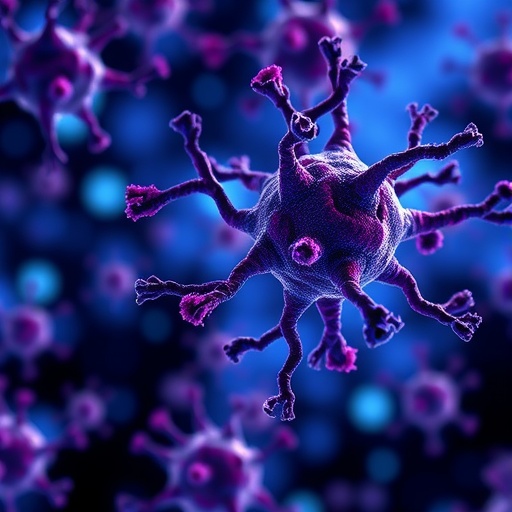In the world of oncology, understanding drug resistance is as crucial as the efficacy of the treatment itself. A recent study highlighted in the Journal of Translational Medicine unveils groundbreaking insights into the mechanisms of resistance against Axitinib, a targeted therapy primarily used to battle advanced renal cell carcinoma. The research, led by Gupta et al., intricately combines advancements in multi-omics technologies with explainable machine learning to delve deep into the context-specific escape pathways that cancer cells utilize to evade the effects of this potent drug.
In cancer treatment, drug resistance often poses a significant hurdle, rendering previously effective therapies ineffective. Axitinib, a second-generation selective inhibitor of the vascular endothelial growth factor receptor (VEGFR), has shown promise in extending progression-free survival in patients with advanced kidney cancer. However, similar to many targeted therapies, cancer cells can develop mechanisms to bypass the drug’s inhibitory effects, resulting in a complex web of resistance pathways. The study scrutinizes these pathways, uncovering vital information about why these cancer cells adapt and alter their behavior in the presence of Axitinib.
What sets this research apart is the innovative use of multi-omics approaches which integrate genomics, transcriptomics, proteomics, and metabolomics. This combination allows for a holistic view of the biological systems at play. By leveraging large-scale datasets generated from these various omic layers, the researchers were able to pinpoint the alterations in cellular pathways and molecular interactions that contribute to Axitinib resistance. This comprehensive methodology reveals not just the ‘what,’ but also the ‘how’ and ‘why’ behind the survival tactics deployed by cancer cells against Axitinib.
The researchers utilized advanced machine learning techniques to analyze the vast amounts of data generated. This approach provided insights into the specific patterns associated with drug resistance that may not be apparent through traditional analysis methods. By employing explainable machine learning, they were able to not only identify resistance pathways but also elucidate the underlying biological significance of each finding. This transparency in the analytical process is vital, as it allows clinicians to understand the biological bases of resistance better and tailor patient-specific treatment plans accordingly.
The findings of the study indicate that cancer cells often activate alternative signaling pathways that circumvent the effects of Axitinib. For instance, alterations in the expression levels of certain proteins involved in angiogenesis and cell survival were commonly observed across the cell lines examined. These findings emphasize the importance of considering the cellular environment and the dynamic interplay of signaling pathways when assessing treatment strategies.
Moreover, the study highlights the potential for utilizing biomarkers identified through this multi-omic analysis to predict which patients are at risk of developing resistance to Axitinib. By correlating specific molecular profiles with treatment outcomes, oncologists could foresee how individual patients might respond to therapy, paving the way for more personalized, effective cancer treatment strategies. The integration of predictive biomarkers into clinical practice could revolutionize how physicians approach treatment plans, potentially switching therapies before resistance develops.
The research also touches on the importance of understanding the tumor microenvironment (TME) in the context of drug resistance. Factors such as hypoxia, immune cell infiltration, and extracellular matrix composition can significantly influence how cancer cells interact with therapeutic agents. Insights gained from this study can inform future clinical trials designed to manipulate the TME, either through combination therapies or novel drug formulations that can more effectively target resistant cell populations.
The implications of this research extend beyond just Axitinib or renal cell carcinoma; they underscore a broader need for interdisciplinary approaches in cancer therapy. The convergence of molecular biology, computational science, and clinical oncology is essential in comprehensively understanding and combating the multifaceted nature of cancer resistance. By fostering collaborations across these fields, researchers can apply similar strategies to other therapeutic agents, potentially unlocking new avenues for successful treatment in various cancers.
As this research unfolds, it calls for further exploration into the mechanisms of escape pathways for other targeted therapies. Oncologists and researchers globally are encouraged to adopt multi-omic methodologies and explainable machine learning not just as tools for understanding drug resistance, but as frameworks for some of cancer’s most pressing challenges.
In light of the promising outcomes presented by Gupta et al., the future of cancer therapy appears to be leaning towards more personalized and data-driven strategies. By harnessing the power of AI and comprehensive biological datasets, it is becoming increasingly conceivable that clinicians will have the means to anticipate treatment responses and adapt strategies on an individual basis, making cancer care more effective and less haphazard.
Furthermore, the integration of these technologies into routine clinical workflows poses challenges that need to be navigated carefully. The translation of research findings into clinical practice demands robust validation and regulatory oversight. The ongoing evolution of AI tools in medicine is set to create a paradigm shift, yet it requires rigorous testing and ethical considerations to ensure patient safety.
In conclusion, the study by Gupta and colleagues sheds light on the dynamic landscape of drug resistance in cancer therapy. With an emphasis on leveraging multi-omic data and machine learning, the research paves the way for innovative, patient-centered approaches in overcoming the challenges posed by resistance mechanisms. This is a crucial step forward in the ongoing battle against cancer, offering hope for enhanced treatment protocols and improved patient outcomes in the not-so-distant future.
Subject of Research: Mechanisms of Axitinib resistance in renal cell carcinoma through multi-omics and explainable machine learning.
Article Title: Deciphering context-specific Axitinib escape pathways via multi-omics and explainable machine learning.
Article References: Gupta, S., Patni, K., Kaur, S. et al. Deciphering context-specific Axitinib escape pathways via multi-omics and explainable machine learning. J Transl Med 23, 1268 (2025). https://doi.org/10.1186/s12967-025-07153-3
Image Credits: AI Generated
DOI: https://doi.org/10.1186/s12967-025-07153-3
Keywords: Axitinib, drug resistance, kidney cancer, multi-omics, explainable machine learning, personalized medicine, tumor microenvironment.




